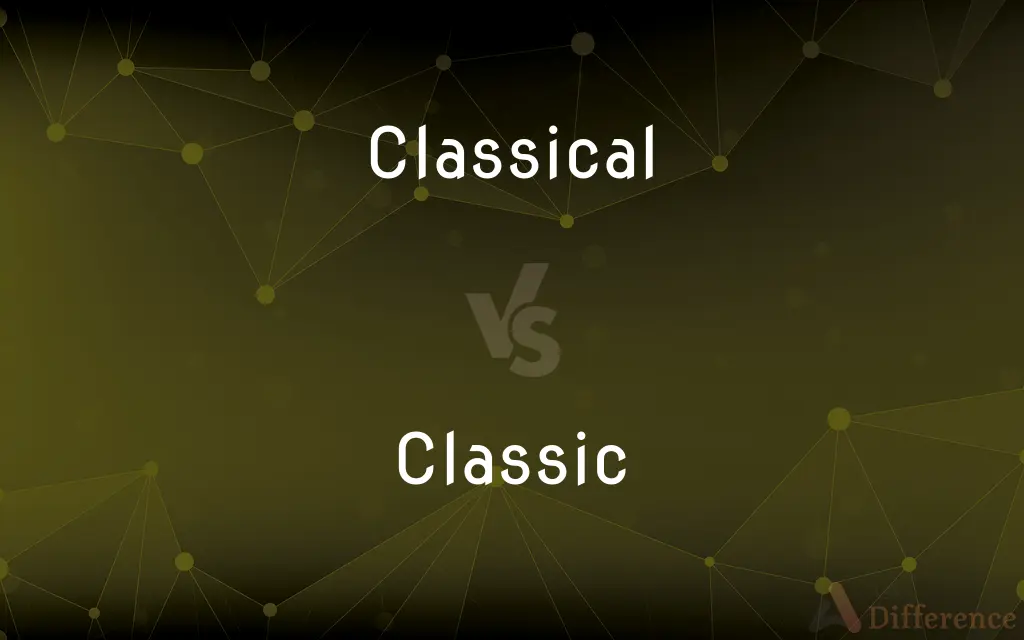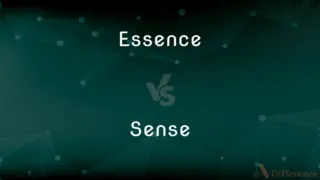Classical vs. Classic — What's the Difference?
Edited by Tayyaba Rehman — By Fiza Rafique — Updated on March 15, 2024
"Classical" refers to the art, architecture, and culture of ancient Greece and Rome, or to a genre of music; "classic" denotes something of lasting value and excellence.

Difference Between Classical and Classic
Table of Contents
ADVERTISEMENT
Key Differences
"Classical" specifically relates to the culture, art, and literature of ancient Greece and Rome, offering a foundation for Western civilization's development. It also pertains to a period and style in music characterized by order, balance, and harmony. On the other hand, "classic" is a broader term used to describe anything that is recognized for its superior quality, enduring value, and timeless appeal, transcending specific periods or styles.
While "classical" music refers to a genre that includes works from the 18th and early 19th centuries by composers like Bach, Mozart, and Beethoven, "classic" music might refer to any piece of music that stands the test of time, including those outside the classical genre. Thus, "classical" is more narrow and defined, whereas "classic" is flexible and expansive in application.
"Classical" art and architecture focus on ideals of symmetry, proportion, and disciplined expression, directly inspired by the ancients. Conversely, "classic" in the context of art, literature, or other domains, signifies works or styles that achieve a standard of excellence and are influential over a long period, not confined to a specific era or style.
The distinction extends into everyday language and categories beyond art and music. For instance, a "classical" education often emphasizes the study of ancient languages and philosophies, while a "classic" education might refer to a well-rounded, timeless curriculum.
"Classical" underscores a specific connection to ancient Greece and Rome and a defined period in music, emphasizing historical and stylistic precision. "Classic" denotes a broader criterion of excellence and timelessness, applicable across various fields including literature, film, and more, suggesting something that maintains relevance and admiration regardless of era.
ADVERTISEMENT
Comparison Chart
Definition
Pertaining to ancient Greece and Rome, or a music genre.
Denotes timeless quality, excellence, and enduring value.
Scope
Specific to certain arts, periods, or education.
Broad, applies to various fields and eras.
Example in Art
Sculptures and architecture from ancient civilizations.
Works universally acknowledged as masterpieces.
Example in Music
Symphonies by Mozart or Beethoven.
Any music piece recognized for its lasting appeal.
Education
Focus on ancient languages and classical philosophies.
Emphasizes a comprehensive, enduringly relevant curriculum.
Compare with Definitions
Classical
Relating to ancient Greek or Roman literature, art, or culture.
The Parthenon is a prime example of classical architecture.
Classic
Characterized by simplicity, balance, and purity of form; of lasting interest and significance.
The design of the Model T Ford is a classic example of early automobile engineering.
Classical
A period in music from roughly 1750 to 1830 emphasizing harmony and form.
Beethoven's Fifth Symphony is a monumental work in the classical music repertoire.
Classic
An enduring and popular item or style.
A little black dress is a classic piece in fashion.
Classical
Art or literature that adheres to traditional standards and high quality.
Shakespeare's works are often studied as examples of classical literature.
Classic
Typical or exemplary of a particular style.
This dish is a classic example of French cuisine.
Classical
Education based on the study of ancient Greek and Roman texts.
He received a classical education, studying Latin and Greek rigorously.
Classic
A work of art, literature, music, etc., recognized as being of the highest quality and enduring value.
To Kill a Mockingbird is considered an American classic.
Classical
Involving traditional and long-established theories or styles.
Classical physics includes the laws of motion described by Newton.
Classic
Reflecting a traditional or established quality.
His response was a classic example of his wit and humor.
Classical
Of or relating to the ancient Greeks and Romans, especially their art, architecture, and literature.
Classic
A classic is an outstanding example of a particular style; something of lasting worth or with a timeless quality; of the first or highest quality, class, or rank – something that exemplifies its class. The word can be an adjective (a classic car) or a noun (a classic of English literature).
Classical
Conforming to the artistic and literary models of ancient Greece and Rome.
Classic
Belonging to the highest rank or class.
Classical
Versed in the classics
A classical scholar.
Classic
Serving as the established model or standard
A classic example of colonial architecture.
Classical
Of or relating to European music during the latter half of the 18th and the early 19th centuries.
Classic
Having lasting significance or worth; enduring.
Classical
Of or relating to music in the educated European tradition, such as symphony and opera, as opposed to popular or folk music.
Classic
Adhering or conforming to established standards and principles
A classic piece of research.
Classical
Of, relating to, or being a variety of a language that is epitomized by a prestigious body of literature.
Classic
Of a well-known type; typical
A classic mistake.
Classical
Standard and traditional
Classical methods of navigation.
Classic
Of or characteristic of the literature, art, and culture of ancient Greece and Rome; classical.
Classical
Relating to or being a school of thought or field of study that is established and widely accepted before others
Classical economics.
Classic
Formal, refined, and restrained in style.
Classical
Of or relating to physics that can be described without the use of quantum mechanics or relativity.
Classic
Simple and harmonious; elegant
The classic cut of a suit.
The classic lines of a clipper ship.
Classical
Relating to or consisting of studies in the humanities and general sciences
A classical curriculum.
Classic
Having historical or literary associations
Classic battlefields of the Civil War.
Classical
Of or relating to the first class or rank, especially in literature or art.
Classic
An artist, author, or work generally considered to be of the highest rank or excellence, especially one of enduring significance.
Classical
Of or pertaining to established principles in a discipline.
Classic
A work recognized as definitive in its field.
Classical
(music) Describing Western music and musicians of the late 18th and early 19th centuries.
Classic
A literary work of ancient Greece or Rome.
Classical
Describing art music (rather than pop, jazz, blues, etc), especially when played using instruments of the orchestra.
Classic
Classics The languages and literature of ancient Greece and Rome. Used with the.
Classical
Of or pertaining to the ancient Greeks and Romans, especially to Greek or Roman authors of the highest rank, or of the period when their best literature was produced; of or pertaining to places inhabited by the ancient Greeks and Romans, or rendered famous by their deeds.
Classic
One that is of the highest rank or class
The car was a classic of automotive design.
Classical
Knowledgeable or skilled in the classics; versed in the classics.
A classical scholar
Classic
A typical or traditional example.
Classical
Conforming to the best authority in literature and art; chaste; pure; refined
Classical dance.
Classic
(Informal) A superior or unusual example of its kind
The reason he gave for being late was a classic.
Classical
(physics) Pertaining to models of physical laws that do not take quantum or relativistic effects into account; Newtonian or Maxwellian.
Classic
A traditional event, especially a major sporting event that is held annually
A golf classic.
Classical
(countable) One that is classical in some way; for example, a classical economist.
Classic
Of or relating to the first class or rank, especially in literature or art.
Classical
(chess) classical chess
Classic
Exemplary of a particular style; defining a class/category; typical.
Classical
Of or characteristic of a form or system felt to be of first significance before modern times
Classic
Exhibiting timeless quality and excellence.
"To Kill a Mockingbird" is a 1960 classic book by Harper Lee.
Classical
Of recognized authority or excellence;
The definitive work on Greece
Classical methods of navigation
Classic
Characteristic of or from the past; old; retro; vintage.
Watching classic movies as a hobby
Classic
Of or pertaining to the ancient Greeks and Romans, especially to Greek or Roman authors of the highest rank, or of the period when their best literature was produced; of or pertaining to places inhabited by the ancient Greeks and Romans, or rendered famous by their deeds.
Classic
Traditional; original.
Users who dislike the new visual layout can return to classic mode.
Classic
A perfect and/or early example of a particular style.
Classic
An artistic work of lasting worth, such as a film or song; a work of enduring excellence.
Classic
The author of such a work.
Classic
A major, long-standing sporting event.
Classic
(horse racing) Any of the British Classic Races, five long-standing Group 1 horse races run during the traditional flat racing season.
Classic
(dated) One learned in the literature of Ancient Greece and Ancient Rome; a student of classical literature.
Classic
Of or relating to the first class or rank, especially in literature or art.
Give, as thy last memorial to the age,One classic drama, and reform the stage.
Mr. Greaves may justly be reckoned a classical author on this subject [Roman weights and coins].
Classic
Of or pertaining to the ancient Greeks and Romans, esp. to Greek or Roman authors of the highest rank, or of the period when their best literature was produced; of or pertaining to places inhabited by the ancient Greeks and Romans, or rendered famous by their deeds.
Though throned midst Latium's classic plains.
The epithet classical, as applied to ancient authors, is determined less by the purity of their style than by the period at which they wrote.
He [Atterbury] directed the classical studies of the undergraduates of his college.
Classic
Conforming to the best authority in literature and art; chaste; pure; refined; as, a classical style.
Classical, provincial, and national synods.
Classic
A work of acknowledged excellence and authority, or its author; - originally used of Greek and Latin works or authors, but now applied to authors and works of a like character in any language.
In is once raised him to the rank of a legitimate English classic.
Classic
One learned in the literature of Greece and Rome, or a student of classical literature.
Classic
A creation of the highest excellence
Classic
An artist who has created classic works
Classic
Characteristic of the classical artistic and literary traditions
Classic
Adhering to established standards and principles;
A classic proof
Common Curiosities
Why are certain designs or styles described as classic?
Designs or styles are termed "classic" because they exhibit timeless quality, aesthetic appeal, and functionality, remaining popular or esteemed over long periods.
What is the main difference between classical and classic?
"Classical" relates to ancient Greece and Rome or a specific music genre, while "classic" refers to something of enduring quality and universal appeal.
Can a work be both classical and classic?
Yes, works from ancient Greece and Rome or the classical music period can be considered "classic" due to their lasting excellence and influence.
How does classical education differ from other educational approaches?
Classical education focuses on the study of ancient texts and languages, emphasizing critical thinking and a broad understanding of culture, unlike more contemporary methods that might prioritize specialized or technical knowledge.
Can the term classic be applied to technology?
Yes, the term can apply to technology that has had a significant impact, demonstrates enduring design or functionality, or exemplifies a turning point in technological development.
Can modern works be considered classic?
Modern works can be considered classic if they achieve widespread acclaim and are likely to be of lasting interest or value to future generations.
How does one determine if something is a classic?
Something is considered a classic if it has been widely recognized for its excellence, enduring value, and influence over a significant period.
Is all classical music considered classic?
While most classical music is revered for its artistry and has endured over time, being "classic" also applies to works outside this genre for their timeless appeal.
What makes classical architecture distinct?
Classical architecture is distinct for its emphasis on symmetry, proportion, and the use of columns and pediments, drawing inspiration from ancient Greek and Roman buildings.
What role does public opinion play in classifying something as classic?
Public opinion, alongside critical acclaim and scholarly analysis, plays a crucial role in classifying works as classic, reflecting collective acknowledgment of their lasting value and significance.
Share Your Discovery

Previous Comparison
Baited vs. Bated
Next Comparison
Essence vs. SenseAuthor Spotlight
Written by
Fiza RafiqueFiza Rafique is a skilled content writer at AskDifference.com, where she meticulously refines and enhances written pieces. Drawing from her vast editorial expertise, Fiza ensures clarity, accuracy, and precision in every article. Passionate about language, she continually seeks to elevate the quality of content for readers worldwide.
Edited by
Tayyaba RehmanTayyaba Rehman is a distinguished writer, currently serving as a primary contributor to askdifference.com. As a researcher in semantics and etymology, Tayyaba's passion for the complexity of languages and their distinctions has found a perfect home on the platform. Tayyaba delves into the intricacies of language, distinguishing between commonly confused words and phrases, thereby providing clarity for readers worldwide.















































